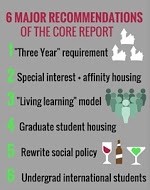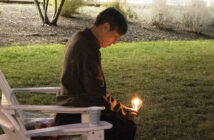The Commission on Residential Environment report was released to the Lehigh community July 7 and addresses issues associated with the campus climate in both on- and off-campus residences.
Eight working groups identified specific problems and worked to create six suggestions for improving the Lehigh campus community. Over 60 people worked to examine Lehigh’s social policies and issues to create both large- and small-scale solutions.
The 148-page document details each recommendation individually and is broken into four sections. The first section offers an idea of what the future of Lehigh’s residential areas might look like. The second section details the information that each working group gathered and the conclusion and recommendation they created. The third section provides recommendations that would require large funds to execute and the fourth provides smaller-scale solutions to the identified problems.

The six major recommendations of the CORE report. (Klaudia Jazwinska and Emily Okrepkie/Made with Canva)
The first major recommendation is to require students to live on campus for three years.
The undergraduate social scene has moved off campus in recent years, and those who live off campus and hold social gatherings tend to live and socialize with members of their own Greek organization or sports team, according to the report. Because of this, parties are often exclusive. In addition, the houses where social gatherings are held are often a safety hazard when packed with more people than the fire code permits.
The members of the working group who created this solution believe these issues would be solved or reduced if students were to live on campus for their first three years at Lehigh. According to the report, the members of the working group who reached this conclusion believe this requirement will bring the social scene back on campus and create a more inclusive environment.
The working group believes this suggestion would require 500 additional beds on campus.
The second major recommendation is to focus on strengthening special interest and affinity housing.
Special interest and affinity housing, such as the multicultural Umoja house or the substance-free CHOICE housing, focuses on creating a living environment based on a central idea or principle.
The members of the working group who reached this conclusion believe a residential environment with a specific focus would enhance both the social and academic environments for involved students. To implement this recommendation, the report suggests staff members in the Office of Residence Life run these programs so they are structured and consistent.
The third major recommendation is that a “Living Learning” model of residential life is developed.
This model would expand upon the Residential Fellow Program, which is a program where faculty or staff members live in residence halls with students. The goal of this program is to facilitate relationships between faculty members and students while enhancing the learning experience for students. This suggestion would require new infrastructure, committed faculty members and rewards for faculty who participate in the program.
The fourth major recommendation is that more housing is provided for graduate students.
The working group to develop this recommendation noted that graduate students, especially international graduate students, may not know how to go about leasing a home. Additionally, undergraduate students sign leases between one and two years early and prevent graduate students from finding housing that is close to campus.
Working group six, which focused on graduate student life and housing, suggested that Lehigh both purchase and maintain housing on lower campus for graduate students as well as build new housing in the same area for them.
The fifth major recommendation is that Lehigh’s social policy be rewritten.
The report notes that fraternities “have a near monopoly on holding parties, because sororities’ national chapters forbid them from serving alcohol” and “the barriers erected by the social policy are too high for other social groups to serve alcohol.” This recommendation was not followed by an explicit suggestion, and the report states that there must be more study done in this area to rectify the issue.
The sixth and final recommendation is to improve support for undergraduate international students.
The report suggests that international students undergo a week-long orientation upon arrival, so they are educated about the challenges they will face as international students. It also suggests that international students live with American students who are interested in learning about other cultures. International students should be picked up from airports upon first arriving in the United States to attend Lehigh, and trips should be organized to accommodate international students who cannot go home over breaks, according to the report.
In addition to the six major recommendations, the working groups came up with various solutions to other problems within the Lehigh community. These recommendations address other issues or expand upon a major recommendation.
One suggestion is to improve relations with the South Side community by creating an advisory board made of South Side residents and Lehigh community members. The report also suggests that landlords be held to a higher standard.
Another recommendation meant to break down class barriers is that students should not be placed in housing based on when they submit their housing deposit. Because wealthier students often apply early decision and submit their housing deposits earlier because they have the financial ability to do so, there is a divide in dorms based on socioeconomic status.
The groups suggested that younger students in on-campus houses be supervised more, even if they are in a Greek house, and older students supervised less. It was also suggested that the residential experience be streamlined so student experiences do not vary drastically based on residential area.
Another suggestion was that there should be a conscious effort to include international students in programming and provide them with resources when they move off campus. They should also be given resources to help understand American culture, such as programs during orientation, while still maintaining ties to their own by having the option to eat food that is native to their homeland.
The report suggests that graduate students be integrated into the Lehigh community. Additionally, according to the report, graduate students who are Gryphons and teaching assistants are often asked to do more work than they are responsible for. It suggests Lehigh create a position or organization so someone can oversee the Gryphon and teaching assistant programs.
The report also notes that sororities and fraternities dominate the social scene at Lehigh, and one working group suggested that new facilities be built to foster an inclusive environment where all organizations can gather.
The recommendations in the CORE report are not final, and individuals can voice their opinions by emailing [email protected] or posting to an online forum.





Comment policy
Comments posted to The Brown and White website are reviewed by a moderator before being approved. Incendiary speech or harassing language, including comments targeted at individuals, may be deemed unacceptable and not published. Spam and other soliciting will also be declined.
The Brown and White also reserves the right to not publish entirely anonymous comments.